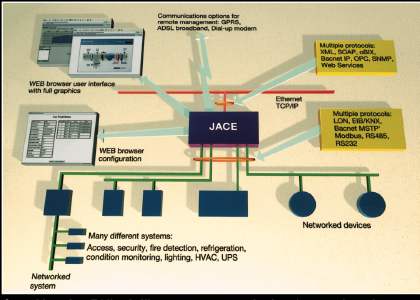Tridium develops Niagara framework for OEM equipment
Tridium has developed what is described as a breakthrough in control for building-services plant for use by OEMs. It is based on Tridium’s Niagara open framework. Products using Niagara Appliance are fully web-enabled and can work ‘straight out of the box’, with simple browser set up to provide system functions that would normally require skilled engineering to commission. Chris Irwin of Tridium says, ‘Increasingly, OEMs are looking for packaged control solutions which satisfy three fundamental objectives — easy set up and configuration, remote management capability and the versatility to operate independently or offer added-value integration as par of a wider building-management system, regardless of protocols and without costly gateways.’ Niagara Appliance is suitable for air-handling units, chillers, boilers, pumps, lighting, security and power systems. It is pre-configured and pre-loaded at the factory, where it is tailored to the requirements of the equipment being controlled.

Control based on Tridium’s Niagara open communications framework can be incorporated into OEM equipment. Among the capabilities of Niagara Appliance are configuration capability via a web browser and communication with a wider network without costly gateways.
Since Niagara Appliance uses the Java-based Niagara Framework, it can also integrate the equipment into a BMS using LonWorkd, BACnet, Modbus and other communications standards.
Related links:








